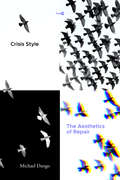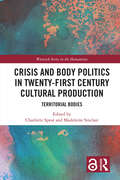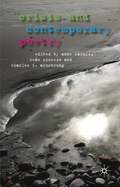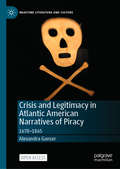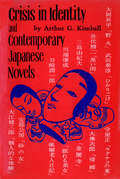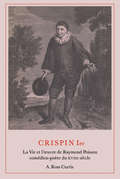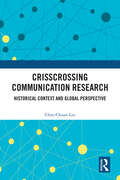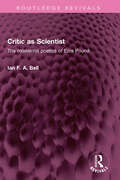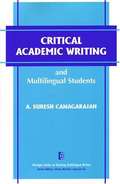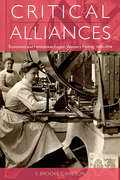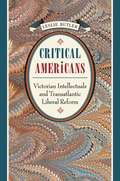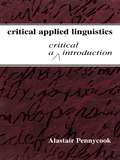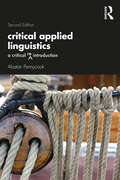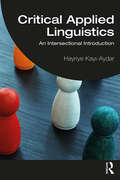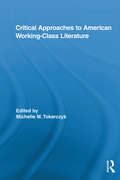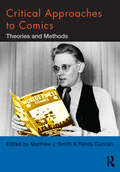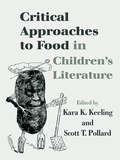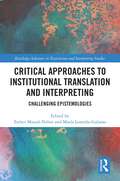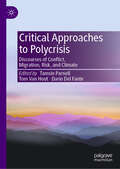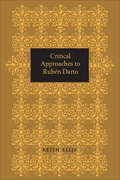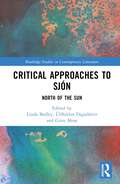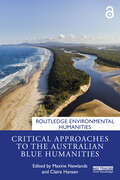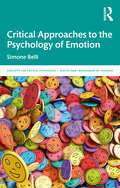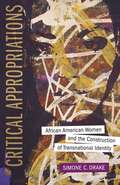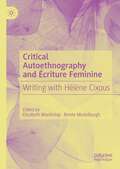- Table View
- List View
Crisis Style: The Aesthetics of Repair (Post*45)
by Michael DangoIn this expansive and provocative new work, Michael Dango theorizes how aesthetic style manages crisis—and why taking crisis seriously means taking aesthetics seriously. Detoxing, filtering, bingeing, and ghosting: these are four actions that have come to define how people deal with the stress of living in a world that seems in permanent crisis. As Dango argues, they can also be used to describe contemporary art and literature. Employing what he calls "promiscuous archives," Dango traverses media and re-shuffles literary and art historical genealogies to make his case. The book discusses social media filters alongside the minimalism of Donald Judd and La Monte Young and the television shows The West Wing and True Detective. It reflects on the modernist cuisine of Ferran Adrià and the fashion design of Issey Miyake. And, it dissects writing by Barbara Browning, William S. Burroughs, Raymond Carver, Mark Danielewski, Jennifer Egan, Tao Lin, David Mitchell, Joyce Carol Oates, Mary Robison, and Zadie Smith. Unpacking how the styles of these works detox, filter, binge, or ghost their worlds, Crisis Style is at once a taxonomy of contemporary cultural production and a theorization of action in a world always in need of repair. Ultimately, Dango presents a compelling argument for why we need aesthetic theory to understand what we're doing in our world today.
Crisis and Body Politics in Twenty-First Century Cultural Production: Territorial Bodies (Warwick Series in the Humanities)
by Charlotte Spear Madeleine SinclairThe twenty-first century has been deemed the “Age of Crisis”. We are witnessing the catastrophic unfolding of environmental crisis, financial crisis, pandemic and conflict. But are we to understand these crises as new phenomena? Is their seemingly simultaneous existence purely coincidental? Or rather do they instead form part of a singular, historically produced, unfolding crisis, which only today has reached a generalised consciousness? And perhaps most urgently, how far can we separate the crises of human experience from those exacted upon the land?The chapters collected in Crisis and Body Politics in Twenty-First Century Cultural Production: Territorial Bodies deploy the framework of “Territorial Bodies” to address urgent social, ecological and political challenges. Examining themes such as (inter)national bodily governance, racialised bodies, eco-feminist movements, spatial justice and bodily displacement, this collection provides a deeper analysis of the interconnected forms of violence perpetrated against marginalised human and non-human bodies, taking this combined violence as the defining feature of contemporary crisis.
Crisis and Contemporary Poetry
by Anne Karhio Seán Crosson Charles I. ArmstrongWhat are the means available to poetry to address crisis and how can both poets and critics meet the conflicts and challenges they face? This collection of essays addresses poetic and critical responses to the various crises encountered by contemporary writers and our society, from the Holocaust to the ecological crisis.
Crisis and Legitimacy in Atlantic American Narratives of Piracy: 1678-1865 (Maritime Literature and Culture)
by Alexandra GanserThis Open Access book, Crisis and Legitimacy in Atlantic American Narratives of Piracy: 1678-1865, examines literary and visual representations of piracy beginning with A.O. Exquemelin’s 1678 Buccaneers of America and ending at the onset of the US-American Civil War. Examining both canonical and understudied texts—from Puritan sermons, James Fenimore Cooper’s The Red Rover, and Herman Melville’s “Benito Cereno” to the popular cross-dressing female pirate novelette Fanny Campbell, and satirical decorated Union envelopes, this book argues that piracy acted as a trope to negotiate ideas of legitimacy in the contexts of U.S. colonialism, nationalism, and expansionism. The readings demonstrate how pirates were invoked in transatlantic literary production at times when dominant conceptions of legitimacy, built upon categorizations of race, class, and gender, had come into crisis. As popular and mobile maritime outlaw figures, it is suggested, pirates asked questions about might and right at critical moments of Atlantic history.
Crisis in Identity
by Arthur G. KimballThis book is intended to encourage the reading, study, and appreciation of contemporary Japanese fiction and, through it, an understanding of Japan and Japanese culture. The various chapters, including the Syllabus at the end, aim to stimulate and encourage general readers and students to deepen their knowledge of the available literature. The Syllabus in particular aims to encourage the teaching of Japanese literature in the classroom, at both high school and university level, by supplying the teacher and student with study aids. The book is based on an important and much-discussed contemporary theme, that of identity.
Crispien Ier: La Vie et l'œuvre de Raymond Poisson comédien-poète du XVIIe siècle
by A. Ross CurtisRaymond Poisson, a contemporary of Molière, was the leading comic actor with the troupe of the Hôtel de Bourgogne and later at the Comédie Française during the first five years of its existence. He popularized one of the French stage's best-loved stock characters, the impudent servant Crispin, while finding time to supply his troupe with short comedies in which he himself starred. This study is thoroughly documented and reflects the author's detailed knowledge of, and interest in, the period. It establishes Poisson's place in theatrical history, and illuminates a whole tradition in French theatre in the seventeenth century.
Crisscrossing Communication Research: Historical Context and Global Perspective
by Chin-Chuan LeeDrawing on studies of international communication and late Qing and Republican newspapers, this book examines the intellectual and practical development of communication from a global and historical perspective.The book is organized in two parts. The first part explores the “domestication” and fragmentation of communication studies, examining how domestic communication paradigms have been transformed into “refined mediocrity” and how international communication is now included in discussions of “modern theory”. Focusing on the newspapers of China’s Republican era, the second part explores the history of journalism from a variety of perspectives and addresses several key research issues. By exploring ways to connect theories in the humanities and social sciences, bridging the gap between Eastern and Western cultures, and interweaving case studies and macro-level theorizing, the author shows that communication analysis is necessarily dialectical, specific, complementary, and conditional. The book sheds important light on how acting locally while thinking globally can help us reconstruct the epistemological and methodological foundations of international communication.The title will appeal to scholars and students in communication studies, journalism, and the social sciences, especially those interested in international communication.
Critic as Scientist: The modernist poetics of Ezra Pound (Routledge Revivals)
by Ian F. BellFirst published in 1981, Critic as Scientist provides a detailed and scholarly account both of the scientific background and of contemporary artistic issues in its analysis of Ezra Pound’s poetics. During the crucial period of his years in London, Ezra Pound was striving to formulate not only a new system of poetics but also a new language through which he could both define the critic’s procedure and announce his modernity. It was in science that Pound discovered the vocabulary that became his most characteristic gesture during the literary crises of the time. The use of scientific terminology in his ‘propaganda’ for a new ‘renaissance’ belonged, initially, to specifically American modes of aesthetic tradition, as typified by Whistler and aspects of New England transcendentalism. A consideration of popular versions of physics and biology, and of the ‘scientific attitude’ displayed by such contemporaries as Fenollosa, Hulme, Ford and Eliot, reveals that the major terms and practices of Pound’s critical vocabulary were located in the issues of nineteenth and early twentieth-century science. The author has sought to demystify key words in the Poundian vocabulary and has suggested a wider literary and cultural context for the study of Pound’s aesthetic theory. This book will be of interest to students of literature.
Critical Academic Writing and Multilingual Students
by Canagarajah A. SureshThe critical approach to L2 writing is arguably one of the most significant recent developments in L2 writing pedagogy. A. Suresh Canagarajah provides a thorough discussion of this topic in Critical Academic Writing and Multilingual Students. This volume facilitates teacher self-reflection and enables readers to better understand the motivations and pedagogical implications--especially for L2 writing--of a more openly pedagogical approach. Critical Academic Writing and Multilingual Students explains what it means to commit to an academic pedagogy, in terms of form, self, content, and community--and what it can accomplish in the L2 writing classroom. It's a guide for writing teachers who wish to embark on a journey toward increased critical awareness of the role they play, or potentially could play, in the lives of their students.
Critical Alliances: Economics and Feminism in English Women’s Writing, 1880–1914
by S. Brooke CameronCritical Alliances argues that late-Victorian and modernist feminist authors saw in literary representations of female collaboration an opportunity to produce new gender and economic roles for women. It is not often that one thinks of female allegiances – such as kinship networks, cultural inheritance, or lesbian marriage – as influencing the marketplace; nor does one often think of economic models when theorizing feminist cooperation. S. Brooke Cameron suggest that, through their representations of female partnership, feminist authors such as Virginia Woolf, Olive Schreiner, George Egerton, Amy Levy, and Michael Field redefined the gendered marketplace and, with it, women’s professional opportunities. Interdisciplinary at its core and using a contextual approach, Critical Alliances selects cultural texts and theories relevant to each writer’s particular intervention in the marketplace. Chapters look at how different forms of feminist collaboration enabled women to stake their claim to one of the many, emergent professions at the turn of the century.
Critical Americans
by Leslie ButlerIn this intellectual history of American liberalism during the second half of the nineteenth century, Leslie Butler examines a group of nationally prominent and internationally oriented writers who sustained an American tradition of self-consciously progressive and cosmopolitan reform. She addresses how these men established a critical perspective on American racism, materialism, and jingoism in the decades between the 1850s and the 1890s while she recaptures their insistence on the ability of ordinary citizens to work toward their limitless potential as intelligent and moral human beings.At the core of Butler's study are the writers George William Curtis, Thomas Wentworth Higginson, James Russell Lowell, and Charles Eliot Norton, a quartet of friends who would together define the humane liberalism of America's late Victorian middle class. In creative engagement with such British intellectuals as John Stuart Mill, Thomas Carlyle, Matthew Arnold, Leslie Stephen, John Ruskin, James Bryce, and Goldwin Smith, these "critical Americans" articulated political ideals and cultural standards to suit the burgeoning mass democracy the Civil War had created. This transatlantic framework informed their notions of educative citizenship, print-based democratic politics, critically informed cultural dissemination, and a temperate, deliberative foreign policy. Butler argues that a careful reexamination of these strands of late nineteenth-century liberalism can help enrich a revitalized liberal tradition at the outset of the twenty-first century.
Critical Applied Linguistics: A Critical Introduction
by Alastair PennycookThis accessible guide and introduction to critical applied linguistics provides a clear overview, highlighting problems, debates, and competing views in language education, literacy, discourse analysis, language in the workplace, translation and other language-related domains. Covering both critical theory and domains of practice, the book is organized around five themes: the politics of knowledge, the politics of language, the politics of texts, the politics of pedagogy, and the politics of difference. It is an important text for anyone involved in applied linguistics, TESOL, language education, or other language-related fields.
Critical Applied Linguistics: A Critical Re-Introduction
by Alastair PennycookNow in its second edition, this accessible guide and introduction to critical applied linguistics provides a clear overview of the problems, debates, and competing views in language education, literacy, discourse analysis, language in the workplace, translation, and other language-related domains. Covering both critical theory and domains of practice, the book is organized around five themes: the politics of knowledge, the politics of language, the politics of difference, the politics of texts, and the politics of pedagogy. Recognizing that a changing world requires new ways of thinking, and that many approaches have watered down over time, the new edition applies a sharp, fresh look at established and new intellectual frameworks. The second edition is comprehensively updated with additional research throughout and features new discussions of colonialism, queer theory, race and gender, translanguaging, and posthumanism. With a critical focus on the role of applied linguists, Pennycook emphasizes the importance of a situated, collaborative perspective that takes the discussion away from questions of implementation, and insists instead that critical applied linguistics has to be an emergent program from the contexts in which it works. This landmark text is essential reading for students and researchers of applied linguistics, multilingualism, language and education, TESOL, and language and identity.
Critical Applied Linguistics: An Intersectional Introduction
by Hayriye Kayı-AydarThis highly accessible, up-to-date introduction provides an overview of critical applied linguistics through an intersectionality framework. The book reflects recent developments through a discussion and evaluation of key questions, diverse perspectives, and practices for social change. As it unpacks different forms of marginalization and privilege, it relates them to language use, critical pedagogies, and critical intersectional advocacy in applied linguistics. This book is a source of reference for all applied linguists; undergraduate/graduate students in applied linguistics, TESOL, and other relevant programs; classroom teachers; and language teacher educators. It aims to foster critical reflection, critical thinking, and intersectional advocacy. Examples, suggested readings, discussion questions, and questions for reflection not only help personalize the content but also enable the reader to further understand what motivates research, critical practice, and social action in critical applied linguistics.
Critical Approaches to American Working-Class Literature (Routledge Studies in Twentieth-Century Literature)
by Michelle M. TokarczykThis book is one of the first collections on a neglected field in American literature: that written by and about the working-class. Examining literature from the 1850s to the present, contributors use a wide variety of critical approaches, expanding readers’ understanding of the critical lenses that can be applied to working-class literature. Drawing upon theories of media studies, postcolonial studies, cultural geography, and masculinity studies, the essays consider slave narratives, contemporary poetry and fiction, Depression-era newspaper plays, and ethnic American literature. Depicting the ways that working-class writers render the lives, the volume explores the question of what difference class makes, and how it intersects with gender, race, ethnicity, and geographical location.
Critical Approaches to Comics: Theories and Methods
by Matthew J. Smith Randy DuncanCritical Approaches to Comics offers students a deeper understanding of the artistic and cultural significance of comic books and graphic novels by introducing key theories and critical methods for analyzing comics. Each chapter explains and then demonstrates a critical method or approach, which students can then apply to interrogate and critique the meanings and forms of comic books, graphic novels, and other sequential art. The authors introduce a wide range of critical perspectives on comics, including fandom, genre, intertextuality, adaptation, gender, narrative, formalism, visual culture, and much more. As the first comprehensive introduction to critical methods for studying comics, Critical Approaches to Comics is the ideal textbook for a variety of courses in comics studies. Contributors: Henry Jenkins, David Berona, Joseph Witek, Randy Duncan, Marc Singer, Pascal Lefevre, Andrei Molotiu, Jeff McLaughlin, Amy Kiste Nyberg, Christopher Murray, Mark Rogers, Ian Gordon, Stanford Carpenter, Matthew J. Smith, Brad J. Ricca, Peter Coogan, Leonard Rifas, Jennifer K. Stuller, Ana Merino, Mel Gibson, Jeffrey A. Brown, Brian Swafford
Critical Approaches to Food in Children's Literature (Children's Literature and Culture #Vol. 59)
by Kara K. Keeling Scott T. PollardCritical Approaches to Food in Children’s Literature is the first scholarly volume on the topic, connecting children's literature to the burgeoning discipline of food studies. Following the lead of historians like Mark Kurlansky, Jeffrey Pilcher and Massimo Montanari, who use food as a fundamental node for understanding history, the essays in this volume present food as a multivalent signifier in children’s literature, and make a strong argument for its central place in literature and literary theory. Written by some of the most respected scholars in the field, the essays between these covers tackle texts from the nineteenth century (Rudyard Kipling’s Kim) to the contemporary (Dave Pilkey’s Captain Underpants series), the U.S. multicultural (Asian-American) to the international (Ireland, Brazil, Mexico). Spanning genres such as picture books, chapter books, popular media, and children’s cookbooks, contributors utilize a variety of approaches, including archival research, cultural studies, formalism, gender studies, post-colonialism, post-structuralism, race studies, structuralism, and theology. Innovative and wide-ranging, Critical Approaches to Food in Children’s Literature provides us with a critical opportunity to puzzle out the significance of food in children’s literature.
Critical Approaches to Institutional Translation and Interpreting: Challenging Epistemologies (ISSN)
by María Lomeña-GalianoThis collection re-envisions the academic study of institutional translation and interpreting (ITI), uncovering the ways in which institutional practices have inhibited knowledge creation and encouraging stakeholders to continue to challenge the assumptions and epistemics which underpin the field.ITI is broadly conceived here as translation and interpreting delivered in or for specific organizations and institutional social systems, spanning national, supranational, and international organizations as well as financial markers, universities, and national courts. This volume is organized around three sections, which collectively interrogate the knower – the field itself – to engage in questions around “how we know what we know” in ITI and how institutions have contributed to or hindered the social practice of knowledge creation in ITI studies. The first section challenges the paths which have led to current epistemologies of ignorance while the second turns the critical lens on specific institutional practices. The final section explores specific proposals to challenge existing epistemologies by broadening the scope of ITI studies.Giving a platform to perspectives which have been historically marginalized within ITI studies and new paths to continue challenging dominant assumptions, this book will appeal to scholars and policymakers in translation and interpreting studies.
Critical Approaches to Polycrisis: Discourses of Conflict, Migration, Risk, and Climate
by Tom Van Hout Tamsin Parnell Dario Del FanteThis book critically examines how polycrisis is recontextualised and (ab)used in contemporary discourse from across Europe. The book brings together established and emerging researchers in the field of discourse studies from around the world to explore the accelerating interconnected challenges of climate change, conflict, risk, Brexit, democracy, COVID-19, the rising cost of living, and migration. Recognising that polycrisis is socially produced, constructed and dismantled through discourse, the authors contemplate the discursive manifestations of crisis. Falling under the banner of critical discourse studies (CDS), the methodological approaches are heterogeneous, including, but not limited to, corpus-assisted CDS and multimodal CDS. The data are equally varied, ranging from focus groups to no-war letters, media representations to environmental protection commercials. The volume provides a comprehensive consideration of how critical approaches to discourse can help to make sense of, resist, and respond to (poly)crisis, and it will be of interest to students and scholars working in the remit of discourse studies, with a particular interest in crisis communication.
Critical Approaches to Rubén Darío
by Keith EllisRubén Darío (1867-1916) of Nicaragua was the leader of the important Latin American literary movement known as Modernism. He is considered by many to be the greatest poet in Latin American literature, and the volume of writings devoted to his work since 1884 is perhaps greater than that on any other writer in the history of Spanish American literature. The celebration in 1967 of the centenary of his birth gave rise to a formidable number of new analyses, increasing the need for the classification and assessment of the many studies. In this book Professor Ellis examines and evaluates the wide range of methods and perspectives available to the reader of Darío's works. He considers the biographical approach, social and political questions, influences and sources, structural analysis (providing three structural studies of his own), and, in an appendix, Darío's own concept of the role of the literary critic. His book is comprehensive both in time and in range, and includes an up-to-date bibliography. This is the first systematic study of the critical works on a Spanish American writer. It is significant not only in its treatment of the work on an individual author, but also as a reflection on and an indication of the trends, methods, and preoccupations of modern appraisals of Latin American writing.
Critical Approaches to Sjón: North of the Sun (Routledge Studies in Contemporary Literature)
by Linda Badley Úlfhildur Dagsdóttir Gitte MoseCritical Approaches to Sjón: North of the Sun is the first English-language book-length study of the works of the Icelandic contemporary poet Sjón (Sigurjón Birgir Sigurðsson, b. 1962), who is considered by some to be Iceland’s most distinctive and multifaceted contemporary author. This collection of essays introduces readers to Sjón’s rich body of writing and its transmedial and stylistic range, cultural breadth, thematic diversity, and intellectual depth. Essays in the volume have been brought together from around the world and cover Sjóns's beginnings as a neo-surrealist performance artist and poet (translated into over 20 languages), his career as a novelist (translated into over 30 languages), and his collaborations with translators, singer-songwriters, film directors, and other writers. Approaches range from the narratological, historical, ethical, epistemological, and mythological to theoretical methodologies such as thing theory, queer theory, disability studies, and ecocriticism.
Critical Approaches to the Australian Blue Humanities (ISSN)
by Claire Hansen Maxine NewlandsThis interdisciplinary edited collection explores and analyses the field of the blue humanities through an Australian lens. The blue humanities is a way of understanding humanity’s relationship with water and manifestations of what is referred to as the ‘blue’ – reefs, oceans, rivers, creeks, basins, and inland bodies of water.In its scope, this collection emphasises both the importance of the local and the interconnectedness of Australia with global environmental concerns. It considers how we conceptualise watery spaces and shades of blue in a country where water is often marked by its absence, its ephemerality, its politicisation, and its dangers. Contributors from environmental history, environmental social science, political science, literary studies, creative arts, Indigenous Knowledge, education, and anthropology tackle various entanglements between the human, the more-than-human, and watery Australian spaces in modern culture. It is the first volume to offer a specific, dedicated focus on the intersections between Australian space and the blue humanities, and it offers a pathway for those wishing to explore, critique, and advance ideas around the blue humanities in both research and teaching.Directly contributing to a growing interdisciplinary field, this is the first book to comprehensively examine the blue in Australia, appealing to scholars, educators, and students working across the humanities and social sciences with an interest in the environmental humanities, ecopolitics, ecocriticism, the blue humanities, cultural geography, environmental history, and the role of place.Chapter 2 of this book is freely available as a downloadable Open Access PDF at http://www.taylorfrancis.com under a Creative Commons Attribution-Non Commercial-No Derivatives (CC-BY-NC-ND) 4.0 license.
Critical Approaches to the Psychology of Emotion (Concepts for Critical Psychology)
by Simone BelliThis fascinating book explores the different methodologies, resources and strategies that have been used to study emotion, and identifies emerging trends and research perspectives in the field. Emotion is a subject that has been thoroughly investigated in all fields of social and behavioural sciences. And yet the more we have attempted to individualize emotions and set limits that separate the different types of emotions, the more the subject has resisted these categorizations. Mapping the changes and diverse perspectives in the study of emotion, author Simone Belli explores how a critical psychology of emotion has emerged in order to answer this paradox, examining emotions within a social framework. Divided into five chapters, the book uses interdisciplinary critical approaches to cover everything from the interaction between emotion and language, to emotional contagion such as the spread of fear in a pandemic. There is also a particular focus on emotion analysis in digital environments, which have left a deep mark on our lives from the beginning of this century. Showcasing a selection of important investigations that have dealt with the study of emotions in society, Critical Approaches to the Psychology of Emotion is essential reading for students of critical social psychology, sociolinguistics, sociology, anthropology and philosophy.
Critical Appropriations: African American Women and the Construction of Transnational Identity (Southern Literary Studies)
by Simone C. DrakeFrom the novels of Toni Morrison to the music of Beyoncé Knowles, the cultural prevalence of a transnational black identity, as created by African American women, is more than a product of geographic mobility. Rather, as author Simone C. Drake shows, these constructions illuminate our understanding of a chronically marginalized demographic. In Critical Appropriations, Drake contends that these fluid and hetero-geneous characterizations of black females arise from multiple creative outlets -- literature, film, and music videos -- and reflect African Ameri-can women's evolving concept of home, community, gender, and family.Through a close examination of Toni Morrison's Paradise, Danzy Senna's Caucasia, Gayl Jones's Corregidora, Erna Brodber's Louisiana, and Kasi Lemmons's film Eve's Bayou, as well as Beyoncé Knowles's B-Day album and music-video collaboration with Shakira, "Beautiful Liar," Drake reveals how concepts of hybridity -- whether positioned as créolité, Candomblé, négritude, Latinidad, or Brasilidade -- are appropriated in each work of art as a way of challenging the homogeneous paradigm of black cultural studies. This redefined notion of identity enables African American women to embrace a more complex, transnational blackness that is not only more liberating but also more pertinent to their experiences. Drawing from this borderless exchange of ideas and a richer concept of self, Critical Appropriations offers a rewarding reconsideration of the creative implications for African American women, mapping new directions in black women's studies.
Critical Authoethnography and Écriture Feminine: Writing with Hélène Cixous
by Elizabeth Mackinlay Renée MickelburghThe project offers a collection of new interdisciplinary critical autoethnographic engagements with Hélène Cixous écriture feminine and work Three steps on the ladder of writing. Critical autoethnography shares a reciprocal, and inter-animating relationship with Hélène Cixous’ écriture feminine (“feminine writing”), and in this collection authors explore that inter-animation by explicitly engaging with Three steps on the ladder of writing. Three steps is a poetic, insightful, and ultimately moving reflection on the writing process and explores three distinct areas essential for writing: The School of the Dead—the notion that something or someone must die in order for good writing to be born; The School of Dreams—the crucial role dreams play in literary inspiration and output; and The School of Roots—the importance of depth in the 'nether realms' in all aspects of writing. Topics covered include: ways Cixous’ work can address the need for loss and reparation in writing critical autoethnography, how Cixous’ writing “makes our body speak” through concepts of birth and the body in, through and of critical autoethnography, whether writing in this way recast and reform prevailing orders of domination and oppression, and how Cixous’ writing around the ethics of loving and giving translates into response-able and non-violent forms of critical autoethnography in relation to otherness and difference. In this collection, we invite you to “Let us go to the school of [critical autoethnographic] writing” (Cixous, 1993, p. 3) with the work of Hélène Cixous, and speak in a different way and through a different medium of academic language, in an approach that reveals the tensions, the paradoxes, the pains and the pleasures of writing with critical autoethnography in the contemporary university.
